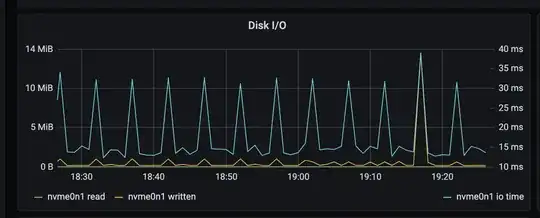I've set up an Ubuntu Server with microk8s, with the dns, dashboard and prometheus addons. It's running some Cardano nodes.
On the (built-in) Grafana dashboard "Default / Nodes" I see spikes in the Disk IO "on time" every 5 minutes like clockwork:
I'm curious what this is - I don't know anything that Ubuntu/microk8s would be doing exactly every 5 minutes. How can I identify what this is? (ideally without installing additional software on the host). I can't find anything in any log files that gives a clue.
